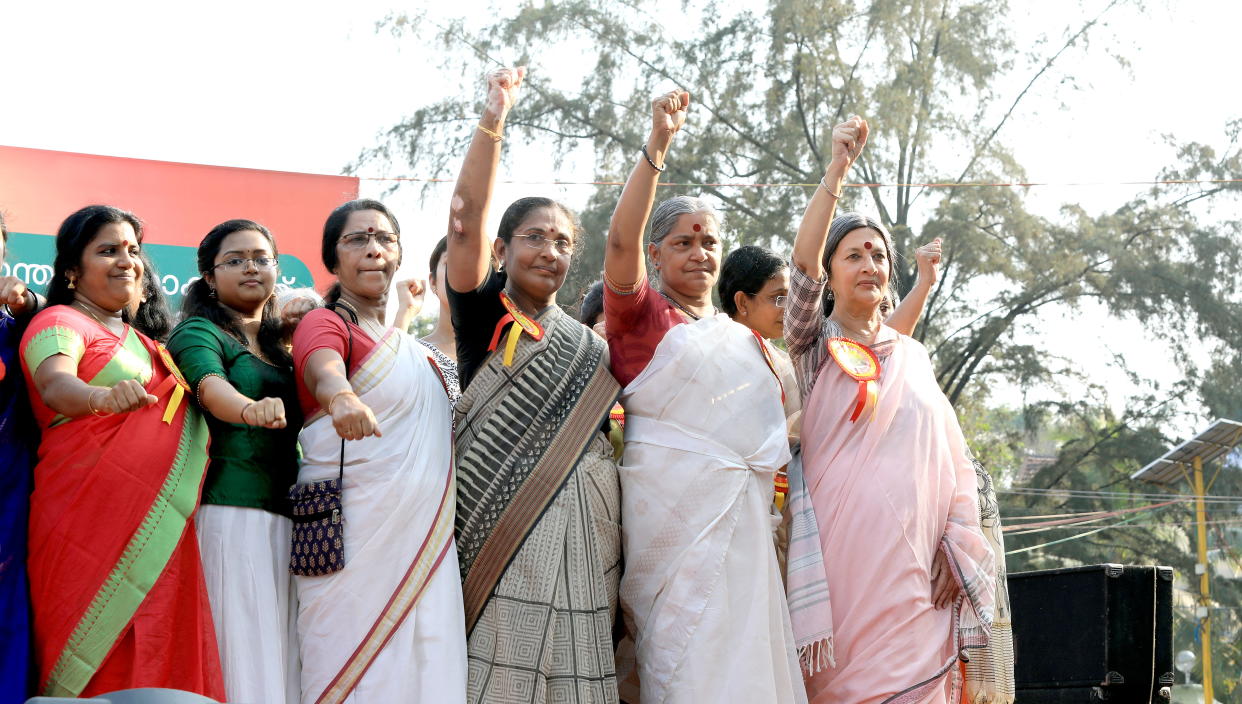Millions form a 385-mile 'women's wall' in India to protest gender inequality

Millions of women came together to take a bold stand against gender inequality in India.
Forming a 385-mile human chain, protestors joined together on Tuesday to build a “women’s wall” stretching across the Indian state of Kerala.
They were fighting for their right to enter the Sabarimala Temple, one of the holiest sites in Hinduism. Last September, the Supreme Court in India overturned a centuries-old rule that banned “menstruating women,” defined as any woman between ages 10 and 50, from entering the temple.
Despite the official ruling, when more than a dozen women tried to enter the sacred site this past fall, violent mobs blocked the trail to the temple. Even the official site for the Sabarimala Temple still reinforces: “Girls who have not yet attained puberty and elderly women who have reached menopause are allowed entry into the temple.”
Spurred by the lack of change, millions of women came together to stand up to those fighting against the updated policy. While organizers initially predicted a turnout of about three million people for the New Years Day event, BBC reports that more than 5 million women—along with men and transgender allies—banned together to stand up for women.
The massive gathering spanned an area nearly double the distance from New York to D.C. In comparison, the 2017 Women’s March — the largest single-day protest in U.S. history — drew about a million protestors.
Politician Jameela Prakasam said of attending the demonstration, “This is for showing the women folk that this is your right.” Trupti Desai, a women’s rights activist, shared a similar sentiment: “It is a victory of the movement of equality and it is a victory of women power.”
“This is a great way of saying how powerful women are, and how we can empower ourselves and help each other,” Kavita Das, a young demonstrator, told the BBC. “Of course, I support the move to allow women of all ages into the temple. I don’t think tradition or any kind of backwardness should stop women.”
The internet chimed in with their thoughts as well:
The era of women folding hands and submitting to patriarchy is beginning to end from here. They will throw their fists on the air and demand for their rights. Women's wall is just a beginning, a baby step of the impending cultural revolution. #WomensWall #VanithaMathil pic.twitter.com/cK1QpXQBk2
— Pishu Mon (@PishuMon) January 1, 2019
Women wall #WomensWall #WomenWall #Kerala #NewYear2019 pic.twitter.com/e15r6vMTmI
— Gad fly (കടന്നല്) (@kattu_katannal) January 1, 2019
Wow. I lived and studied in Kerela, India. IN Thiruvananthapuram. This is soooooo inspiring. And moving. My love and gratitude and joyous sisterhood vibes to all the women of the #WomensWall #TimesUp #WeMatter YAAAAAAAAAAAAAAS! https://t.co/Z0ey8mVA8U
— kerry washington (@kerrywashington) January 2, 2019
Something Beautiful is happening in Kerala right now. You're witnessing history. Women standing in solidarity with each other fighting for our rights. Should happen in all states. 2019 is lit. #WomensWall #Respect
— Priyanka (@autumnrainwish) January 1, 2019
Transgenders from Kudumbasree – Kunnukuzhi, extending their support for #VanithaMathil.Together we learn, together we fight, together we survive.#WomensWall #OurRenaissance pic.twitter.com/VHsxFt0lG6
— Arjun Ramakrishnan (@aju000) January 1, 2019
They came like streams, joined to form rivers, merged in an ocean of humanity and progressive thinking. A day to remember #OurRenaissance values and to pledge that we will carry it in our hearts forever.#VanithaMathil #WomensWall pic.twitter.com/7E5D7ZisoA
— Arjun Ramakrishnan (@aju000) January 1, 2019
And their voices were heard. On Wednesday, Bindu Ammini, 40, and Kanaka Durga, 39, made history, becoming the first women to worship at the shrine, according to the BBC.
Read more from MAKERS:

